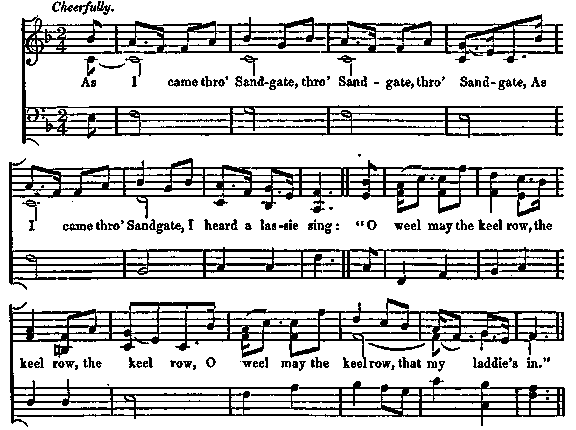Popular Music Of The Olden Time Vol 2
Ancient Songs, Ballads, & Dance Tunes, Sheet Music & Lyrics - online book
| Share page | Visit Us On FB |
|
|
||||
|
722 |
ENGLISH SONG AND BALLAD MUSIC. |
|||
|
|
||||
|
The earliest form in -which I have observed it in print is as a country-dance, entitled Smiling Polly. In several of the collections of the last century, such as Thompson's 200 Country Dances, ii. 63 [1765], it is so included. In these copies the second part of the tune differs.
The words of The keel row are in Ritson's Northumberland Garland, 1793 ; in Bell's Rhymes of the Northern Bards, 1812 ; and in several later collections. |
||||
|
|
||||
 |
||||
|
|
||||
|
O whe's like my Johnny,
Sae leish, sae blithe, sae bonny ?
He's foremost among the mony
Keel lads o' coaly Tyne : He'll set and row so tightly, Or in the dance—so sprightly— He'll cut and shuffle sightly ;
Tis true—were he not mine. |
He wears a blue bonnet, Blue bonnet, blue bonnet; He wears a blue bonnet,—
A dimple in his chin : And weel may the keel row, The keel row, the keel row ; And weel may the keel row,
That my laddie's in. |
|||
|
|
||||
|
CAKE, THOU CANKER OF OUR JOYS.
This air is now better known as " When the rosy morn appearing," from the words which were sung to it, as a Round, in the opera of Rosina. " Care, thou canker of our joys," was written by the Rev. Dr. Grant, and I was informed by the late Ralph Banks, organist of Rochester Cathedral, that the tune was composed by John Garth, of Durham, the adapter of English words to Marcello's Psalms. It has never been published with any name attached.
Charles Mackay's song, " Trusting heart, though men deceive thee," was written to the tune. |
||||
|
|
||||